Papers by Marie-Évelyne Le Poder
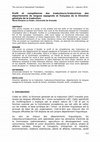
This article consists of a study of the profiles and the skills of the translators of the Departm... more This article consists of a study of the profiles and the skills of the translators of the Departments of Spanish and French who work at the Directorate-General for Translation (Translation DG) in Brussels. Further to a professional internship within the Translation DG of the European Commission, field work based on structured interviews was performed with translators of these Departments. After a brief introduction, we present the theoretical framework of our study (literature review and theoretical basis chosen). Then we present our hypothesis and objectives. Finally, we describe the methodology we have used before analysing the results obtained. RÉSUMÉ Cet article se propose d´étudier le profil et les compétences des traducteurs et traductrices des départements de langues espagnole et française de la Direction générale de la traduction (DGT) à Bruxelles. Suite à un séjour professionnel au sein du service de traduction de la Commission européenne, un travail de terrain s´appuyant sur des entretiens directifs fut mené à bien auprès de ces traducteurs/traductrices. Après une brève introduction, nous présentons le cadre théorique de notre étude (révision de la littérature existante et base théorique retenue). Nous exposons ensuite notre hypothèse et nos objectifs. Finalement, nous décrivons la méthodologie que nous avons appliquée avant de passer à l´analyse des résultats qui ont été obtenus. MOTS CLÉS Direction générale de la traduction, traducteurs/traductrices, départements de langues espagnole et française, travail de terrain, entretiens directifs, profil, compétences.
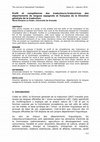
This article consists of a study of the profiles and the skills of the translators of the Departm... more This article consists of a study of the profiles and the skills of the translators of the Departments of Spanish and French who work at the Directorate-General for Translation (Translation DG) in Brussels. Further to a professional internship within the Translation DG of the European Commission, field work based on structured interviews was performed with translators of these Departments. After a brief introduction, we present the theoretical framework of our study (literature review and theoretical basis chosen). Then we present our hypothesis and objectives. Finally, we describe the methodology we have used before analysing the results obtained. RÉSUMÉ Cet article se propose d´étudier le profil et les compétences des traducteurs et traductrices des départements de langues espagnole et française de la Direction générale de la traduction (DGT) à Bruxelles. Suite à un séjour professionnel au sein du service de traduction de la Commission européenne, un travail de terrain s´appuyant sur des entretiens directifs fut mené à bien auprès de ces traducteurs/traductrices. Après une brève introduction, nous présentons le cadre théorique de notre étude (révision de la littérature existante et base théorique retenue). Nous exposons ensuite notre hypothèse et nos objectifs. Finalement, nous décrivons la méthodologie que nous avons appliquée avant de passer à l´analyse des résultats qui ont été obtenus. MOTS CLÉS Direction générale de la traduction, traducteurs/traductrices, départements de langues espagnole et française, travail de terrain, entretiens directifs, profil, compétences.
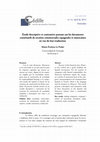
Con la crisis financiera, Marruecos
se ha convertido en un país atractivo para
las empresas españ... more Con la crisis financiera, Marruecos
se ha convertido en un país atractivo para
las empresas españolas que buscan aumentar
sus ventas. Alguno de los requisitos
exigidos por las autoridades marroquíes
para la constitución de sociedades
de responsabilidad limitada es la traducción
jurada del español al francés de las
escrituras de constitución de dichas sociedades.
El presente artículo consiste en un
estudio descriptivo y contrastivo de las
escrituras de constitución de sociedades
españolas y marroquíes con vistas a su
traducción.
Because of the financial crisis, Morocco
has evolved into a good candidate for
Spanish investments. For the creation of
companies with limited responsibility, the
Moroccan authorities require the company’s
articles of association (part of the company’s
memorandum) to be translated from
Spanish to French, which is the language
used for business in Morocco. This article
presents a descriptive and contrastive study
of these documents in the Spanish and
Moroccan cultures from a translational
standpoint.
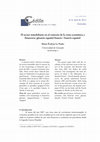
Le présent article s´intéresse au lexique du secteur immobilier dans le contexte de la crise écon... more Le présent article s´intéresse au lexique du secteur immobilier dans le contexte de la crise économique et financière qui, à partir de 2007, a secoué l´économie mon-diale. Notre travail, dont l´objectif principal est l´élaboration d´un glossaire espa-gnol-français / français-espagnol, couvre la période allant de janvier 2007 à décem-bre 2010, et s´appuie sur la version élec-tronique de deux journaux de la presse généraliste: le quotidien espagnol El País, d´une part, et le quotidien français Le Monde, d´autre part. Mots-clé: presse généraliste; secteur im-mobilier; crise économique et financière; glossaire espagnol-français / français-espagnol. Abstract The present paper deals with the vocabulary of the real-estate sector in the context of the economic and financial crisis that, from 2007, has shaken the world economy. Our investigation, the main objective of which is the elaboration of a Spanish-French / French-Spanish glossary, covers the period understood between January, 2007 and December, 2010, being based on the electronic version of two diaries of the general press: the Spanish newspaper El País, on one hand, and the French newspaper Le Monde, on the other one.

resumen: El presente artículo se propone llevar a cabo un trabajo de ob-servación, análisis y des... more resumen: El presente artículo se propone llevar a cabo un trabajo de ob-servación, análisis y descripción de las siglas, entendidas como variantes de unidades terminológicas, en el lenguaje económico de la prensa es-pañola generalista. Pretende establecer unos criterios mínimos concisos y medibles tales como su tipología, caracterización y patrones de aparición. Nuestra investigación se fundamenta en un corpus textual construido a partir de las secciones que el diario El País dedica a la información econó-mica en un período comprendido entre agosto de 2007 y agosto de 2010. Por lo tanto, se desarrolla en el marco de una situación comunicativa de periodista (especializado) a público en general. La propuesta metodológica se articula en torno a los enfoques comunicati-vos de la terminología y la lingüística de corpus. Se apoya en la termino-grafía basada en el uso de corpus textuales que defiende que los términos se deben observar, analizar y describir en el contexto situacional y social en el que se utilizan. Abstract: This article presents the observation, analysis and description of acronyms, as variants of terminological units, in the economic language of the general Spanish Press. The study aims to establish concise, measurable minimum criteria such as their typology, characteristics, and patterns of appearance. cadernos_29.indb 115

Les nouvelles tendances alimentaires observées ces dernières années ont montré un intérêt croissa... more Les nouvelles tendances alimentaires observées ces dernières années ont montré un intérêt croissant des populations pour une alimentation saine et équilibrée, c´est-à-dire, fonctionnelle, ayant contribué à l´apparition d´un nouvel axe de recherche dans les domaines des sciences des aliments et de la nutrition: le domaine des aliments fonctionnels et des nutraceutiques. Susceptible d´offrir de nouveaux débouchés sur le marché de la traduction, ce domaine constitue un terrain privilégié pour la formation de traducteurs/trices mais aussi pour les professionnels/elles du secteur. Ledit domaine a donné lieu à la réalisation d´un travail terminographique systématique de type descriptif et bilingue dont nous exposons ici des résultats partiaux. Le présent travail s´articule autour de cinq parties : cadre théorique de la recherche ; objectifs poursuivis ; méthodologie utilisée ; exposition de résultats partiaux de la recherche ; présentation d´un glossaire espagnol / français.
In recent years, new food trends have been observed that show an increased interest in people for a healthy and balanced diet; that is to say, functional nutrition. This has contributed to the emergence of a new line of research in the field of food and nutrition: functional foods and nutraceuticals. It seems that this research is capable of increasing market share in the translation field. For this reason, it is becoming a well established subject for the training of both students and professionals in translation. The study of the above mentioned field has given rise to the creation of a systematic and descriptive terminological work. In this paper we present a few results obtained from our research. The paper is divided into the following sections: first we present the theoretical framework of our study. We then present our objectives (both main and specific), then the methodology we have followed throughout our investigation. Finally, we discuss the results and we show the glossary we have created.

Les unités linguistiques, au sens large du terme, ont des origines diverses. Elles peuvent naître... more Les unités linguistiques, au sens large du terme, ont des origines diverses. Elles peuvent naître des règles du code linguistique d'une langue, de l'élargissement du signifié d'une unité lexicale déjà formée ou bien provenir d'unités appartenant à d'autres codes ; la « grande catégorie des emprunts » comme l'aime à le dire Marianne Lederer (Lederer 1990 : 1). Lorsqu'il est fait référence aux unités provenant de codes linguistiques étrangers, il convient d'établir une classification entre emprunts et calques linguistiques. Les emprunts comprennent les cultismes, d'une part, et les emprunts aux langues vivantes, d'autre part. Les cultismes sont des emprunts provenant du fonds gréco-latin que l'on retrouve dans diverses langues. Les emprunts aux langues vivantes, pour leur part, s'incorporent dans une langue, de façon consciente ou inconsciente, sans aucune modification (emprunts purs), ou par le biais d'adaptations d'ordre graphique et/ou phonétique.
This article outlines a teaching experience in the lecture room of “Translation 3 C French”
of th... more This article outlines a teaching experience in the lecture room of “Translation 3 C French”
of the B.A. in Translation and Interpretation of the University of Granada. The experience develops
from pre-translation activities related to the analysis-comprehension phase of the translation process.
That is to say, translation itself does not constitute the end of the course. The course places an emphasis
on previous assignments, which, due to a lack of time, are overlooked in certain translation courses.
Cultural references are at the center of the study. They are analyzed in three sources: a Spanish version
of a scientific draft originally in English; a translated version of a free adaptation of a play; and a
French translation of the play.


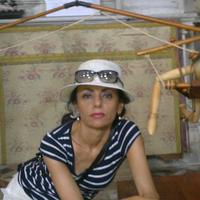






Uploads
Papers by Marie-Évelyne Le Poder
se ha convertido en un país atractivo para
las empresas españolas que buscan aumentar
sus ventas. Alguno de los requisitos
exigidos por las autoridades marroquíes
para la constitución de sociedades
de responsabilidad limitada es la traducción
jurada del español al francés de las
escrituras de constitución de dichas sociedades.
El presente artículo consiste en un
estudio descriptivo y contrastivo de las
escrituras de constitución de sociedades
españolas y marroquíes con vistas a su
traducción.
Because of the financial crisis, Morocco
has evolved into a good candidate for
Spanish investments. For the creation of
companies with limited responsibility, the
Moroccan authorities require the company’s
articles of association (part of the company’s
memorandum) to be translated from
Spanish to French, which is the language
used for business in Morocco. This article
presents a descriptive and contrastive study
of these documents in the Spanish and
Moroccan cultures from a translational
standpoint.
In recent years, new food trends have been observed that show an increased interest in people for a healthy and balanced diet; that is to say, functional nutrition. This has contributed to the emergence of a new line of research in the field of food and nutrition: functional foods and nutraceuticals. It seems that this research is capable of increasing market share in the translation field. For this reason, it is becoming a well established subject for the training of both students and professionals in translation. The study of the above mentioned field has given rise to the creation of a systematic and descriptive terminological work. In this paper we present a few results obtained from our research. The paper is divided into the following sections: first we present the theoretical framework of our study. We then present our objectives (both main and specific), then the methodology we have followed throughout our investigation. Finally, we discuss the results and we show the glossary we have created.
of the B.A. in Translation and Interpretation of the University of Granada. The experience develops
from pre-translation activities related to the analysis-comprehension phase of the translation process.
That is to say, translation itself does not constitute the end of the course. The course places an emphasis
on previous assignments, which, due to a lack of time, are overlooked in certain translation courses.
Cultural references are at the center of the study. They are analyzed in three sources: a Spanish version
of a scientific draft originally in English; a translated version of a free adaptation of a play; and a
French translation of the play.
se ha convertido en un país atractivo para
las empresas españolas que buscan aumentar
sus ventas. Alguno de los requisitos
exigidos por las autoridades marroquíes
para la constitución de sociedades
de responsabilidad limitada es la traducción
jurada del español al francés de las
escrituras de constitución de dichas sociedades.
El presente artículo consiste en un
estudio descriptivo y contrastivo de las
escrituras de constitución de sociedades
españolas y marroquíes con vistas a su
traducción.
Because of the financial crisis, Morocco
has evolved into a good candidate for
Spanish investments. For the creation of
companies with limited responsibility, the
Moroccan authorities require the company’s
articles of association (part of the company’s
memorandum) to be translated from
Spanish to French, which is the language
used for business in Morocco. This article
presents a descriptive and contrastive study
of these documents in the Spanish and
Moroccan cultures from a translational
standpoint.
In recent years, new food trends have been observed that show an increased interest in people for a healthy and balanced diet; that is to say, functional nutrition. This has contributed to the emergence of a new line of research in the field of food and nutrition: functional foods and nutraceuticals. It seems that this research is capable of increasing market share in the translation field. For this reason, it is becoming a well established subject for the training of both students and professionals in translation. The study of the above mentioned field has given rise to the creation of a systematic and descriptive terminological work. In this paper we present a few results obtained from our research. The paper is divided into the following sections: first we present the theoretical framework of our study. We then present our objectives (both main and specific), then the methodology we have followed throughout our investigation. Finally, we discuss the results and we show the glossary we have created.
of the B.A. in Translation and Interpretation of the University of Granada. The experience develops
from pre-translation activities related to the analysis-comprehension phase of the translation process.
That is to say, translation itself does not constitute the end of the course. The course places an emphasis
on previous assignments, which, due to a lack of time, are overlooked in certain translation courses.
Cultural references are at the center of the study. They are analyzed in three sources: a Spanish version
of a scientific draft originally in English; a translated version of a free adaptation of a play; and a
French translation of the play.